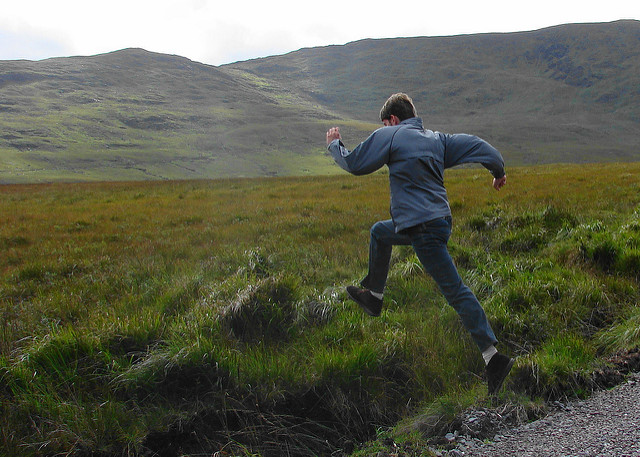A fall into a ditch makes you wiser. – Chinese Proverb

Jumped a ditch this wide before? Speed good? Jump clean and high? Or will you learn from falling in?
What does that mean?
At first you don’t know what a ditch is. Then you fall in. Now you know. You are now wiser, and know to avoid falling into ditches, whenever possible.
Life is like that, test first, then the lesson. So the next step of wisdom is to anticipate possible outcomes and extrapolate from known data.
If a ditch is bad, is a cliff likely be better or worse? Once you can extrapolate from your own experiences, it’s time to start learning from the mistakes of others.
If you read about someone falling in a ditch, or hear someone tell the story of someone who did, hopefully you know to not do the same thing, or at least to take precautions.
Why is becoming wiser important?
Most of us know people who wouldn’t be considered particularly wise. They don’t seem to learn much from their experiences, do they? Whether it’s an experience of good fortune or poor fortune, you can learn things from each and every experience you have.
But if you do not learn, you get to repeat the actions over and over and get the same results and experiences over and over. That doesn’t sound like a lot of fun, does it? Yet some people seem to like doing the same thing over and over, and curse their fate when they get the same results over and over.
We can be that person, or we can try to learn something from each experience we have. In that learning, however imperfect, we get new insight, which can be used on our next attempt. Perhaps we were trying to jump the ditch, and now know we need more speed, or to not slip at the edge and fall in, right?
However we gain the wisdom, we need to keep learning from our experiences, as well as the experiences of others. Otherwise we will continue to do what we have done, and not get any closer to our goals or desires. That is the penalty of lack of wisdom, a much harder road to travel.
Where can I apply this in my life?
What will we learn from each experience? That will depend on a great many things. How quickly can you spot the differences in the results you achieved? What were the reasons for the difference between the results this time compared to any previous time? What can you do differently next time?
Will it always be the right lesson to take from the experience? Goodness, no. Unless it’s a really simple task, or you’ve seen or heard about a particular outcome before, there will be plenty of chances to take away the wrong lesson. Which is why wisdom often comes with experience.
By taking the wrong lesson from an experience, you learn about your ability to tell what went wrong, and become a bit more wise in the process. Do it enough times, and you begin to find yourself as someone others look to for wisdom on that topic. And by sharing your experience and wisdom, you can help them become wise themselves.
What things in your life have you tried, and had trouble figuring out, but then succeeded in accomplishing? If you can now do it easily, then you have become wise at that task. If you’re having trouble thinking of something recent, how about such tasks as feeding yourself or walking? Most of us can do at least one of those things, right?
Now those two examples are things the vast majority of us can do at this stage in our life, but if you’ve ever tried to teach a toddler to tie their shoes, you know how difficult it is for them. If you help them on a regular basis, you can watch them begin to learn the skills and motions required to accomplish the task.
In that manner, you have helped them learn, allowed them the benefit of your wisdom in the arcane skill of tying of shoes. In an era of Crocks, flip-flops and slip-on shoes, it may soon become a dying art. But there are always other skills to master, and over time you will be exposed to them, and learn them.
Humans are learning machines. While it’s true we often don’t acknowledge the fact to ourselves, but even a lazy person will pick things up quickly if there is a new way to get more done with less effort. That’s just how we work. And the more we learn about learning, the better we get at it.
We all fall into ditches from time to time. How many more falls will it take before wisdom begins to take hold?
From: Twitter, @sports_HQ
confirmed at : Really, it’s just a proverb
photo by Seth Sawyers

I had a friend like this. She seldom applied advice given to her by anyone. She never figured out that she was the epitome of “Making the same choices, but expecting different outcomes.” She seldom learned to steer clear of ditches.
I finally put an end to the friendship. Granted, I learned how to see some kinds ditches ahead through listening to her “life.” But, I don’t miss her constant tales of woe.
Thanks for stopping by and for sharing the experience of your (ex-) friend.
Some people can’t learn, and others learn that a tale of woe (and the sympathy generated therefrom) far exceeds the shame and humiliation of not having learned the lesson last time. For some, it is a lifestyle, with well defined benefits. Probably a good idea to let them go their own way (straight into a ditch, right?).